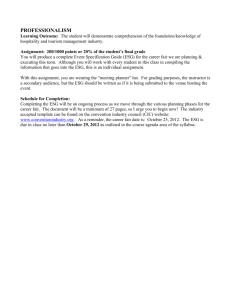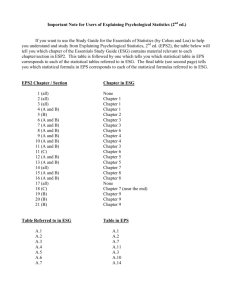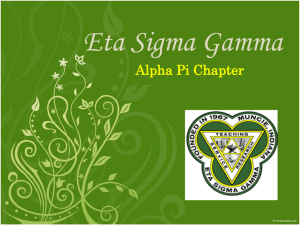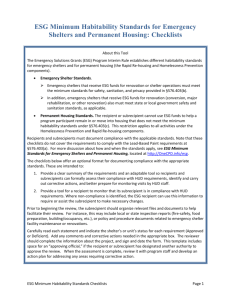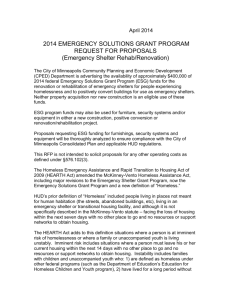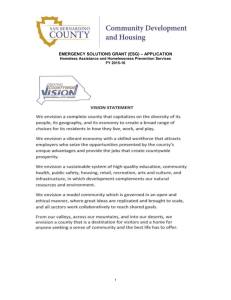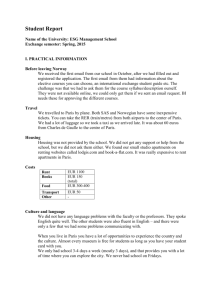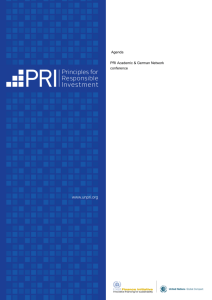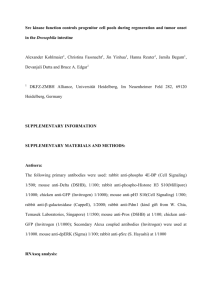DHCD ESG Housing & SHELTER Standards Inspection Checklist
advertisement
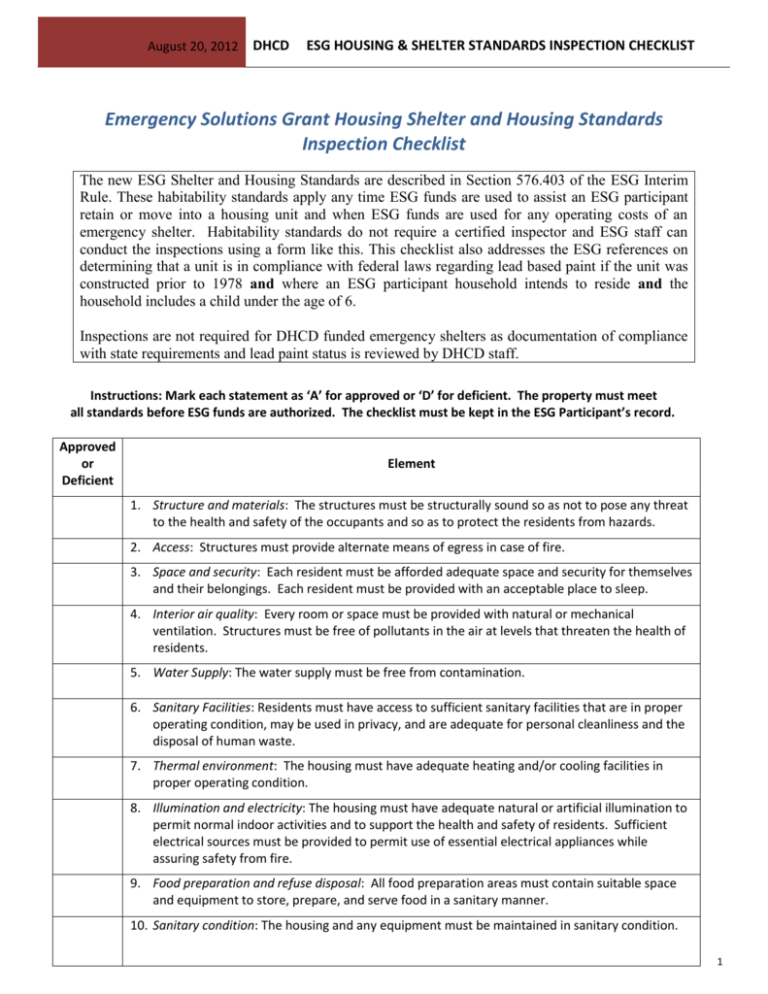
August 20, 2012 DHCD ESG HOUSING & SHELTER STANDARDS INSPECTION CHECKLIST Emergency Solutions Grant Housing Shelter and Housing Standards Inspection Checklist The new ESG Shelter and Housing Standards are described in Section 576.403 of the ESG Interim Rule. These habitability standards apply any time ESG funds are used to assist an ESG participant retain or move into a housing unit and when ESG funds are used for any operating costs of an emergency shelter. Habitability standards do not require a certified inspector and ESG staff can conduct the inspections using a form like this. This checklist also addresses the ESG references on determining that a unit is in compliance with federal laws regarding lead based paint if the unit was constructed prior to 1978 and where an ESG participant household intends to reside and the household includes a child under the age of 6. Inspections are not required for DHCD funded emergency shelters as documentation of compliance with state requirements and lead paint status is reviewed by DHCD staff. Instructions: Mark each statement as ‘A’ for approved or ‘D’ for deficient. The property must meet all standards before ESG funds are authorized. The checklist must be kept in the ESG Participant’s record. Approved or Deficient Element 1. Structure and materials: The structures must be structurally sound so as not to pose any threat to the health and safety of the occupants and so as to protect the residents from hazards. 2. Access: Structures must provide alternate means of egress in case of fire. 3. Space and security: Each resident must be afforded adequate space and security for themselves and their belongings. Each resident must be provided with an acceptable place to sleep. 4. Interior air quality: Every room or space must be provided with natural or mechanical ventilation. Structures must be free of pollutants in the air at levels that threaten the health of residents. 5. Water Supply: The water supply must be free from contamination. 6. Sanitary Facilities: Residents must have access to sufficient sanitary facilities that are in proper operating condition, may be used in privacy, and are adequate for personal cleanliness and the disposal of human waste. 7. Thermal environment: The housing must have adequate heating and/or cooling facilities in proper operating condition. 8. Illumination and electricity: The housing must have adequate natural or artificial illumination to permit normal indoor activities and to support the health and safety of residents. Sufficient electrical sources must be provided to permit use of essential electrical appliances while assuring safety from fire. 9. Food preparation and refuse disposal: All food preparation areas must contain suitable space and equipment to store, prepare, and serve food in a sanitary manner. 10. Sanitary condition: The housing and any equipment must be maintained in sanitary condition. 1 August 20, 2012 DHCD ESG HOUSING & SHELTER STANDARDS INSPECTION CHECKLIST 11. Fire safety: Both conditions below must be met to meet this standard. b. Each unit must include at least one battery-operated or hard-wired smoke detector, in proper working condition, on each occupied level of the unit. Smoke detectors must be located, to the extent practicable, in a hallway adjacent to a bedroom. If the unit is occupied by hearing-impaired persons, smoke detectors must have an alarm system designed for hearing-impaired persons in each bedroom occupied by a hearing-impaired person. a. The public areas of all housing must be equipped with a sufficient number, but not less than one for each area, of battery-operated or hard-wired smoke detectors. Public areas include, but are not limited to, laundry rooms, day care centers, hallways, stairwells, and other common areas. 12. Required in buildings constructed prior to 1978 and where an ESG participant household intends to reside and the household includes a child under the age of 6. Visual assessment means looking for, as applicable: (1) Deteriorated paint (chipping, loose, crumbling); (2) Visible surface paint dust, debris and residue as part of a risk assessment or clearance examination; and (3) The completion or failure of a hazard reduction measure. The unit or non DHCD funded shelter has no observable loose, chipping, or deteriorated paint; or The landlord presented a report from a licensed inspector showing the site is lead free, or the lead has been removed or encapsulated as required under MA state law. (If so, check this box ) (From ESG Interim Rule: prepared by DHCD) CERTIFICATION STATEMENT I certify that I am not a HUD certified inspector and I have evaluated the property located at the address below to the best of my ability and find the following: Property meets all of the above standards. Property does not meet all of the above standards. Therefore, I make the following determination: Property is approved. Property is not approved. ESG Participant Head of Household Name: __________________________________________ Street Address: Apartment: Evaluator’s Signature: City: State: Zip: Date: Please Print Evaluator Name: ______________________________________________ CBO Exec. Dir. Initials: Ef/DHCD/8-20-12 based on the HPRP checklist as a model. 2
